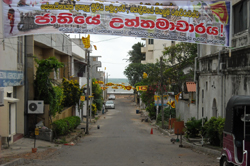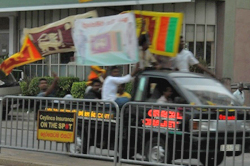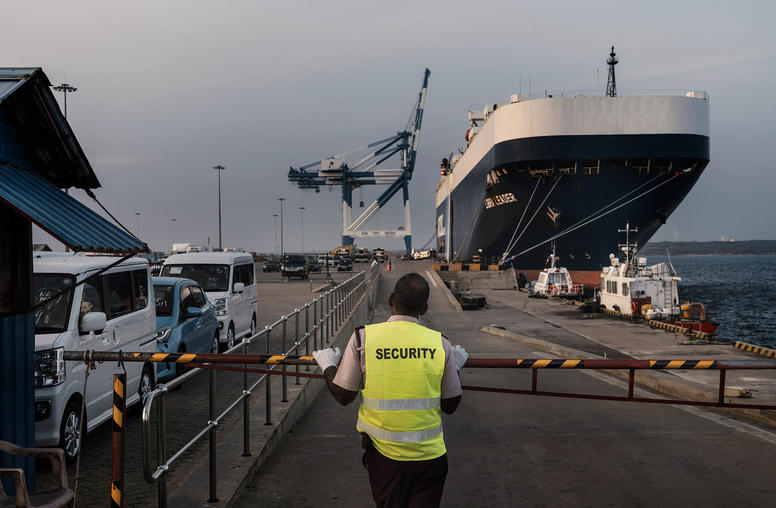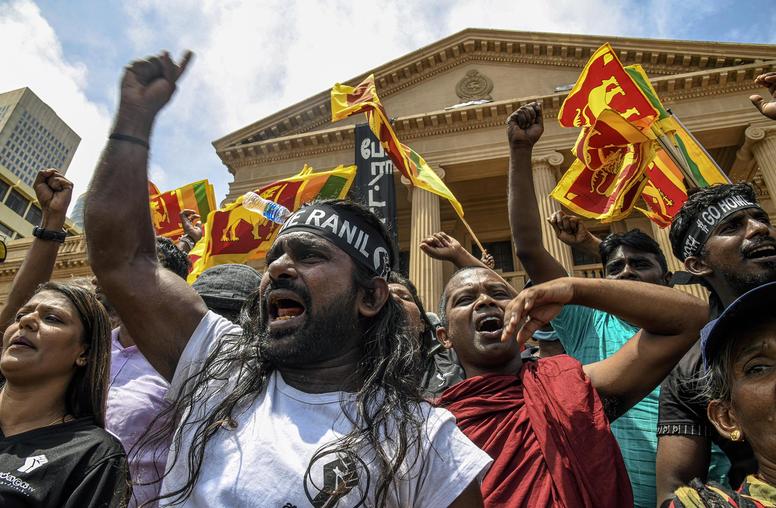USIP peace scholar Benjamin Schonthal provides a first person account of the excitement at the end of Sri Lanka's 30-year civil war. And, he also reminds us that the hard work of peace is just beginning.
Benjamin Schonthal (2009-2010 USIP Peace Scholar) is a University of Chicago doctoral student currently conducting research in Colombo, Sri Lanka. This piece discusses the mood in Colombo on May 20th, 2009 - the day after President Mahinda Rajapakse declared victory in Sri Lanka's twenty-six year old war against the separatist group the Liberation Tigers of Tamil Eelan (LTTE).
I couldn’t sleep last night. They were celebrating on the streets of Colombo. All night long cars were parading below my bedroom window filled with young men cheering and singing, and waving Sri Lanka’s red, yellow, green and orange flag. Celebrating had been going on all day, ever since the president, in an address to parliament, announced that Sri Lanka’s 30-year-long civil war was over. At 11 pm, revelers were still on the streets.
I woke this morning to a critical moment in the history of Sri Lanka. In Colombo, as elsewhere, everyone is wondering what will happen now that the armed conflict, which has dominated the island’s political and economic agenda for three decades, is over. Some are hopeful, optimistic about the possibility that the end of the LTTE will mean the beginning of a new era, a chance to rethink the future of Sri Lanka in more inclusive, more peaceful terms. Others are more guarded and skeptical, worrying that excitement over the end of the war will give way, eventually, to new waves of political majoritarianism and Sinhala chauvinism.
The military offensive is over, but the road from here is much longer and more difficult. Most people agree  that the most immediate needs are humanitarian. The war has taken a tremendous human toll on the island. Thousands have died, many more are now internally displaced. The UNHCR estimates that there are over 250,000 war-displaced people living in crowded government-run camps in North and East of the country. They are homeless, injured and traumatized, many of them having been trapped in or near the front line for weeks. With the massive influx of new refugees into the camps following the military’s final offensive, equipment and personnel will be overburdened.
that the most immediate needs are humanitarian. The war has taken a tremendous human toll on the island. Thousands have died, many more are now internally displaced. The UNHCR estimates that there are over 250,000 war-displaced people living in crowded government-run camps in North and East of the country. They are homeless, injured and traumatized, many of them having been trapped in or near the front line for weeks. With the massive influx of new refugees into the camps following the military’s final offensive, equipment and personnel will be overburdened.
Looming, equally, are the political issues. The government now has to address the deep-running problems which gave rise to LTTE in the first place, a profound sense of disenfranchisement, distrust and frustration among Tamils in Sri Lanka. Some have remarked that the defeat of the LTTE offers Sri Lanka a second chance at correcting some of the political errors made between 1948 and 1972 which led to the rise of militant Tamil nationalism—the establishment of a Sinhala Only language policy, the failure of attempts to devolve greater political autonomy to the North and East, the espousing of Sinhala Buddhist nationalism by politicians seeking reelection.
Looming, equally, are the political issues. The government now has to address the deep-running problems which gave rise to LTTE in the first place, a profound sense of disenfranchisement, distrust and frustration among Tamils in Sri Lanka. Some have remarked that the defeat of the LTTE offers Sri Lanka a second chance at correcting some of the political errors made between 1948 and 1972 which led to the rise of militant Tamil nationalism—the establishment of a Sinhala Only language policy, the failure of attempts to devolve greater political autonomy to the North and East, the espousing of Sinhala Buddhist nationalism by politicians seeking reelection.
But, the end of the LTTE does not mean unwinding the clock. Sri Lankan politics today has a strong international dimension and, as news reports over the last six month have shown, Tamil and Sinhala nationalisms tend to grow more polarized in diaspora. Compared to 1972, the government today is faced with a more challenging task. Not only must it find a way to alter the political architecture of this country to respond to Tamil (and other minorities’) concerns, it must also attend to history, and find a way to acknowledge and address the deep wounds which have developed over the last 30 years here. Rapprochement in Sri Lanka, as in other places, requires forgiveness.
There are also questions about the role of the international community in Sri Lanka. Yesterday, the president, in his address, asserted that the government expects ‘cooperation not interference’ from the international community in coming up with a political solution for the country. In recent months, there has been significant frustration and anger directed at international media, NGOs and foreign governments, accusing them of supporting the LTTE and undermining public support for the war effort by issuing biased reports. There have been protests outside the British High Commission and posters branding American and European diplomats as supporters of terrorism. Some have impugned the motives of local NGOs who receive their funding, in part, from overseas organizations. The military’s success has produced a new brand of nationalism, built on the feeling that Sri Lanka has defeated the LTTE on its own terms, defying international expectations and pressures. Newspaper articles and politicians have proclaimed that Sri Lanka has accomplished what America could not, it has won its war on terror.

International aid agencies will have to be mindful and sensitive to this domestic context, for the sake of themselves and their local partners. However, their expertise and resources will be needed in many ways. Most importantly, sustained programs of assistance must be directed to the psychological and physical welfare of the people who have been displaced by war. Healing these traumas will be a long-term project. Also important over the long term are programs aimed at infrastructure development and rebuilding in the North and East, the areas most affected by the civil war. After years of active military operations, assistance will be needed to decommission and retrain much of Sri Lanka’s large standing army for peacetime tasks.
Ultimately, the burden of reconciliation and rebuilding rests on Sri Lankans, Tamils and Sinhalese together with the island’s third largest community, Sri Lankan Muslims. All communities have suffered, and all will have to contribute if there is there is to be a successful political solution. But, cooperation and reconciliation among communities will require action by the state. In order to restore the good faith and creative energy of its citizens, the Sri Lankan government will have to roll back of war-time restrictions on media freedom and human rights and create space for an active and engaged civil society. Rebuilding trust, between minority and majority communities and between citizens and the state, cannot occur without stronger human rights guarantees.
Today has been declared a national holiday by the president, and many are expecting similar scenes as yesterday. The trucks have started up again, with their cheering and honking. A car drives past, yelling slogans. The Sinhala is too garbled, too fast. I can’t understand it—the tone feels aggressive, but faces are smiling. Across the road, a group of men and women wave from the window of auto-rikshaw decorated with flags.
I spoke with a friend of mine this morning who is Tamil. He was worried about the carloads of young men on the streets, but faintly hopeful about the future. He told me there were rumors of thugery and anti-Tamil intimidation around, celebrators turning aggressive, perhaps after drinking too much Arrak whiskey. A Sinhalese friend of his had called to warn him. He hadn’t seen anything himself, but the rumors were there. His voice didn’t sound anxious. It was difficult to tell. We chatted for a bit longer and said goodbye. Before hanging up, I asked him again about his friend’s warnings. For the moment, he concluded, he’d treat them as rumors.



